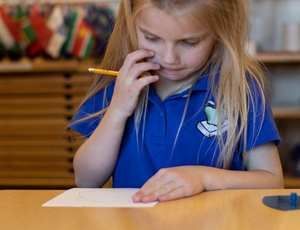When we think about Montessori education, we must consider the important role every adult has in it. In this case, when the child is at home, parents are the facilitators of this philosophy. They will prepare the physical environment, which is essential, but most importantly, they need to prepare themselves. Dr. Montessori was well aware of the hard work adults need to do in order to better serve children. In this month´s article, we will share what concentration is, why it is so important in early development, and our role as parents to protect it.
Concentration is defined as the action or power of focusing one´s attention or mental effort voluntarily. During the 1950s, many psychologists were stating that small children were incapable of concentrating. Dr. Maria Montessori did not feel that was normal and considered those statements to be inaccurate; she was determined to redefine the role of the teacher and the environment to foster concentration, even in very young infants.
Why is Concentration so Important
In Montessori education, concentration is front and center of every aspect. It is optimal for human development; it is the foundation of our work. When we are concentrating, our brain, emotions, and body are connected. We are in control of what is happening to ourselves.
How can we Prepare the Environment to Foster Concentration
- Sense of Order
Organize the space in a way the child feels safe, relaxed, and decompressed. Avoid having a large number of toys in the same place. If you already have plenty, try rotating them. Take out some and store the rest. After a few weeks, change them and observe how your child uses them, making different discoveries than before.
- Reduce Unnecessary Sounds
In many houses, there is at least one television and one speaker for music. Very often, one of them is turned on even if it's not being watched, it is just background noise. Well, it is an interruption for your child. When your child is concentrating using his hands, he also hears the stimuli from the TV or the speaker, which interferes with his effort to focus. Make sure that if you play music, it is purposefully, and try diminishing the screen time, especially if it is used only as a background sound. Another item that is becoming very popular is “Alexa,” a device that apparently can tell you anything, from the oven temperature for baking a cake to playing the song you want at the moment you ask. It sounds lovely, right? However, imagine your child is concentrating and precisely at the moment he is about to master a skill he hears you yell, “Alexa! Play Born This Way by Lady Gaga.” Of course, we know your child’s concentration will be lost. The same goes for screaming from room to room to other family members when your child is working. It has the same effect as yelling at Alexa; it destroys concentration. Be mindful of your child’s auditory space.
- Beauty
Children are naturally attracted to details. They are more likely to use toys spontaneously if they are in a beautiful environment. Consider having real flowers at their height, simple décor at their height, and even the way you display the toys will have an impact on their interest and concentration. Instead of throwing multiple plastic animals in a drawer, try to place them carefully on a basket or tray. It will be so much more inviting than trying to find them in a drawer full of other toys. Also, remember to remove any broken or incomplete toys.
- Cleanliness
Keep the environment clean. Imagine your child wants to use a puzzle, but the moment he touches the knob of one piece, it is sticky. He might be discouraged from using it, and his desire to concentrate on it will be gone.
How can we Protect Concentration
- Observation
Observe the environment and identify if there is something that is an obstacle to your child’s concentration. Also consider if there is something you can add. Observe your child so you can understand when he is concentrating and step back. Avoid interrupting him with phrases like “Good Job.” Avoid helping him when he does not need it yet; let your child make an effort. Through observation, you will identify when your child’s body and mind can do something with a little bit of extra effort, and you won’t interrupt him. Practice is the key, so observe as much as you can.
- Slow Down Your Movements
The energy we put in a room is the energy we get from the room. When you are with your child, try to slow down, avoid walking quickly, running or moving around furniture with vigorous energy. All of these will be factors that will interrupt your child’s concentration. Instead, he will want to join you running as well.
- Avoid Multitasking
Do you carry the laundry basket, take a phone call, and cook at the same time? Well, that is impressive, but you are also modeling doing multiple things at the same time, and we all know the more things you do at the same time, the less you can concentrate on one thing at a time. Avoid modeling it to your child.
- Provide Time and Space for Your Child to Concentrate
Routine is a wonderful way for children to calculate how long they have to play, take a bath, or eat. It also helps in predicting what is next. Avoid surprising your child in the middle of his work, telling him, “leave that on the table because right now we are going with grandma.” The odds are that his concentration will be gone, and he might even feel disoriented and stressed.
- Allow Freedom of Choice
A child that chooses what to do instead of being told what he has to do will be able to concentrate easier and be motivated to do it for more extended periods. Allow repetition. If your child has spent the whole afternoon using crayons and paper, let him repeat it as needed. Avoid asking him to use something different. He is the only one that knows when his needs are satisfied with a toy.
What Does Not Count as Concentration
There is a common mistake adults make when children spend their time with smartphones, video games or TV’s. There is a big difference between entertaining and concentration. When screens passively entertain children, they are just attracted by colors, lights, and music, but they are not contributing to developing powers of controlling one’s thoughts and regulating one’s emotions. On the contrary, most of the time, screen time creates a necessity for the child to get more of it; tantrums and other deviant behaviors are developed, achieving the opposite of concentration. The children are no longer in control of their thoughts or emotions.
Video of the Month
Concentration – National Center for Montessori in the Public Sector
This almost 3 minute video gives a beautiful glimpse of what concentration looks like in a Montessori school setting. You will observe children working and connecting their brains with their hands, and most importantly, you will note no adults are interrupting them. Their space is respected, and they can fully enjoy the satisfaction of concentration.
YouTube link: https://www.youtube.com/watch?v=c9PBJOlm0rw
Quote of the Month
¨Children all sought to free themselves from adults and do everything by themselves, manifesting clearly the desire not to be helped unless such help was absolutely necessary. They were tranquil. Absorbed and intensely interested in their work, achieving an amazing level of serenity¨
- Maria Montessori, The Child in The Family, p. 1
Have a little extra time?
Grab a paper and pen and observe your child for 10 minutes. Here is an observation template for your reference. Make sure all notes are objective without any emotions or preconceived ideas. Once you are done, reflect on your notes and share your experience with your partner. Remember, observation helps in many ways; the information we gather helps to act in the benefit of our children instead of reacting. It is a beneficial skill to develop because it teaches us that many times we need to hold back before stepping in.



